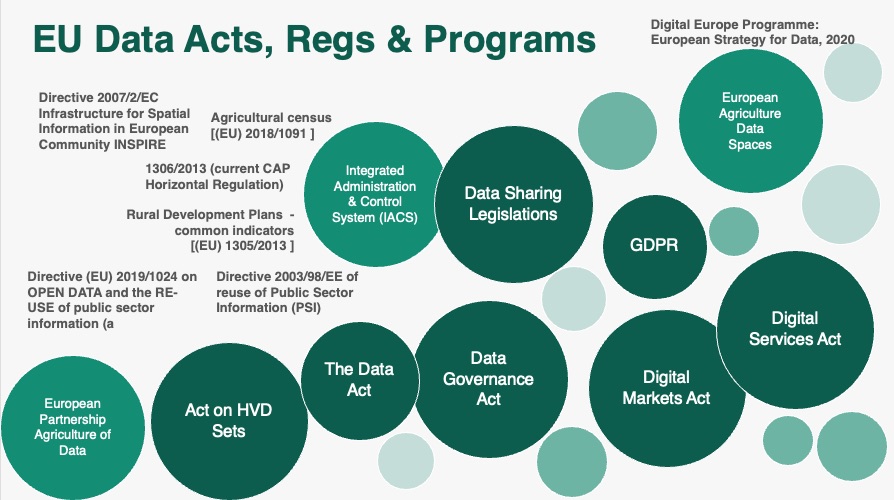
This article was written by Ethan Cleary of the Irish Farmers’ Association.
The world of agriculture is changing. New technologies are emerging that allow farmers to be more precise and productive in their work. However, these same technologies are also creating new challenges and issues when it comes to data, and data is becoming increasingly important as the world looks to feed a growing population in a sustainable way. The issues and challenges associated with agricultural data, include lack of clarity and understanding of what agricultural data is; fear of unintended consequences if agricultural data gets in the wrong hands; and who or what bodies govern agricultural data regulation and legislation.
Fortunately, there are ways to solve these challenges. A combination of technology, industry collaboration and effective policy can create mechanisms like data cooperatives, agricultural data codes of conduct and charters that will help to protect and manage agricultural data.
Data cooperatives are a new way of managing data that allows members to retain control over their data, while still sharing it with others in a safe and secure way. An agricultural data cooperative is a cooperative that collects, stores, and disseminates data related to agriculture. The benefits of agricultural data cooperatives include improved decision-making by farmers, growers, and other agricultural producers; increased efficiency and productivity across the sector; and greater transparency and accountability in the agricultural industry. However, there are limitations including the technical overhead required to build consent, data tracking and auditing mechanisms; the need for members to have a relatively high degree of technical expertise; and the possibility that the data may not be easily disaggregated if required.
An agricultural charter or code of conduct is a set of principles and guidelines for the appropriate use of agricultural data between all the actors involved. They can be developed collaboratively between farmer organisations, industry, and regulatory bodies. They are intended to promote transparency, accountability, and consistency in the use of data in the agricultural sector. These charters set out principles for the use of data, including data governance, data sharing, data security, and data privacy. It also includes guidelines for the use of data in agricultural research, development, and production. The codes are normally voluntary and non-binding and are intended to serve as a framework for the responsible use of data in the agricultural sector.

Figure 1: Ag Data Acts, Regulations and Programmes
Agricultural data codes of conduct and charters can help to set the standard on agricultural data practice, and foster deeper collaboration between technology providers, agri-businesses, farmers and policy makers working together to ensure that agricultural data is used in a way that is beneficial for all.
For more information
Watch Ethan Cleary from the Irish Farmers’ Association (IFA) and DEMETER talk about agricultural data challenges in more detail from this years’ IoT Week conference. https://www.youtube.com/watch?v=nvVxApluD3Q
_____________________________________________________________________________________
 Ethan comes from a 5th generation arable farm and is passionate about connecting agriculture with technology that benefits and supports the farmer. He is currently the Irish Farmers’ Association’s Technology and Innovation Executive responsible for the Association’s overall technological development. From a policy perspective, his current focus is driving the innovation and digital agenda for Irish farmers at an EU and national level with the aim of ensuring farmers benefit from this era of rapid digital transformation.
Ethan comes from a 5th generation arable farm and is passionate about connecting agriculture with technology that benefits and supports the farmer. He is currently the Irish Farmers’ Association’s Technology and Innovation Executive responsible for the Association’s overall technological development. From a policy perspective, his current focus is driving the innovation and digital agenda for Irish farmers at an EU and national level with the aim of ensuring farmers benefit from this era of rapid digital transformation.


